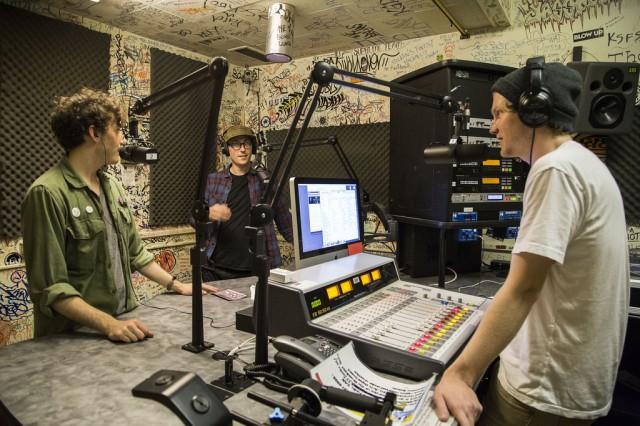Written by Bek Phillips Photos by Gavin McIntyre
“I love you, mom.”
Those were the words she wrote before she emptied a full bottle of Vicodin in her hand and methodically took each pill. All she wanted was to sleep forever and put the last three years of depression behind her. She was eighteen and wanted to die.
Alysa Hanks, twenty-two, is now an anthropology major specializing in forensics and criminal justice. It has been four years since her second suicide attempt, but her depression is still an unspoken breeding ground for fights between her and her father.
“We ignore it,” Hanks says sadly. “If it comes up, we sweep it under the rug so it doesn’t turn into a fight, he never supported me.”
This situation is all too common, according to Kurt Churchill, a practicing marriage and family therapist with specialties in teen and young adult suicide and depression.
“In our society, there is a very negative stigma attached to mental health and parents will think they didn’t raise thier kids right,” Churchhill says, “They have a hard time accepting mental health issues.”
According to the American College Health Association, serious depression and mental health needs are nothing to be in denial about. Thirty percent of college students reported feeling “so depressed that it was difficult to function.” In another study by the National Alliance on Mental Illness, nearly three-fourths of students diagnosed with mental health conditions say they experienced a mental health crisis while in school.
Despite these statistics, the negative stigma surrounding mental health and the idea that you should be able to handle life’s problems without medication keeps many who need help away, and a lot of the time that begins in the home.
“The negative stigma on mental health can be cultural or family-fueled .Those in crisis believe they can handle it within their own group or family,” says Churchill.
In Alysa’s case, this was all too true and has had devastating effects. The summer before her junior year in high school, she became anorexic and struggled daily with depression.
“You don’t really know when [depression] starts,” Alysa says, pausing to find the words that would express her emotions all those years ago. “You struggle with being happy every day and nothing helps, friends and family just don’t exist.”
As she struggled to keep her grades up, stopped eating, and spent more and more time alone, her parents undoubtedly knew something was up. But they would never use the term depression.
“Mom knew, especially when I stopped eating, but it was never talked about, it was ignored. She thought I was just in a funk and would grow out of it.”
And that was when she first attempted suicide.
“When I was depressed, I wasn’t aware of what was going on, all I could think about was how I am so depressed and there is no help for me. I just want to sleep, if I died it would be like falling asleep forever,” says Hanks.
She had a Vicodin prescription that she would take to fall asleep and there was about a half a bottle remaining, but after taking the rest, she fell asleep and woke up retching, with one of the worst hangovers she has ever experienced.
Churchill has it all down to a science. The lizard brain, or the flight or fight area of the brain, has domination during times of mental crises. But before you can get there, people go through a process where they test out their resources, they go to their mom, dad, boyfriend or best friend.
“When people act on the thought of committing suicide, they feel like they have exhausted all their resources, they are done, there is just so much turmoil going on in their head that they can’t take it anymore,” Churchill says.
According to Center for Disease Control, ten percent of adults are depressed. This same study found that adults aged eighteen to twenty-four were the most likely to report “other depression.” Linking that to suicide, according to the National Institute of Mental Health, scientific evidence has shown that almost all people who take their own lives have a diagnosable mental or substance abuse disorder.
“In other words,” Churchill says, “The feelings that often lead to suicide are highly treatable. That is why it is imperative that we better understand the symptoms of the disorders and the behaviors that often accompany thoughts of suicide.”
Now the eighth-leading cause of death overall in the United States, and the third leading cause of death for young people between the ages of fifteen and twenty-four, it has become imperative that we keep an open and knowledgeable discourse going. A large part of this discourse is educating ourselves on signs and symptoms so we can address them in ourselves and others close to us.
“Tragically, many of these signs go unrecognized,” Churchill says. “And while suffering from one of these symptoms certainly does not necessarily mean that one is suicidal, it is always best to communicate openly with a loved one who has one or more of these behaviors, especially if they are unusual for that person.”
For college students, it may be important to take note of the fact that of those who commit suicide, while many may have talked about it beforehand, only thirty-three to fifty percent were identified by their doctors as having a mental illness at the time of their death and only fifteen percent of suicide victims were in treatment at the time of their death. The other staggering statistics from the National Institute of Mental Health state that of the young adults and teens, approximately one-third of teens who die by suicide have made a previous suicide attempt.
On campus there are many resources available for students that are struggling with depression. The counseling center, located in the student services center, gives out six free sessions a year to students. A psychiatrist on campus is also available by reference of the counselors. Beyond this, support groups and other services are available.
SF State’s Counseling and Psychological Services Center offers therapy services for students throughout the academic year. Licensed clinical counselors provide six free private counseling in the student services building on the second floor. Group and couples counseling is also available.
For people who live on campus, students have access to the “Let’s Talk” program, which is a safe and informal counseling program available every weekday in residence halls. Other student services include the CEASE program, which provides free support for drug and alcohol problems, the SAFE place for victims of sexual violence, as well as the Active Minds student group for mental health and suicide prevention education.
Phone numbers to memorize or keep close to you are the San Francisco’s suicide hotline that is open 24-hours at (415) 781-0500, and (415) 989-5212 for Spanish.
For professors or employees at SF State who want to increase their knowledge of depression and suicide and learn some tips on how to help, the Counseling & Psychological Services Center, in conjunction with SF Suicide Prevention, will offer a free 2-day Applied Suicide Intervention Skills Training (ASIST) workshop from 9am-5pm on Thursday, March 27 and Friday, March 28. According to the Counseling and Psychological Services Center, “The goal of ASIST is to increase the knowledge of laypeople to the signs of possible suicide ideation and how to help the person through it – suicide first aid.”
Prefacing a suicide prevention conference at SF State in 2013, Yolanda Gamboa, clinical counselor and suicide prevention coordinator says in an University Communications article that “Mental health disorders typically emerge during the college years, and stressors and environmental factors can be triggers. Symptoms of depression or the diagnosis of a mental illness can be precursors to thoughts of suicide. We want people to know that if they do have these thoughts there’s support available for them.”
However, when walking in to set up an interview with someone from the counseling services, they declined to being interviewed for the school magazine on the basis that scheduling and appointment for an interview might take away from another students time.
Alysa utilized the counseling and psychological services here when she struggled with depression and mania during her freshman year, going to the psychiatrist when she felt she needed immediate attention. But for her, things have been looking up ever since she took the first steps to get help now four years ago.
“I struggled with depression a lot freshman year, but nothing compared to when I was in high school,” Alysa says. “It is hard when you move to a new environment, have to make friends, but it has been two years since I have seen my psychologist, I rarely visit my psychiatrist, and only when I need my meds adjusted.”
Despite her first year struggles, Alysa thrives in her major and works hard. Her passion is evident when she talks about different classes she has taken and how she was ecstatic to take a class in which she was able to work with real human bones. She still takes the lowest dose of antidepressants, and some days are really hard, but she has a steely sense of determination in her voice when she talks about it and the changes she ultimately wishes to see when it comes to depression.
“It’s a part of me,” Alysa says. “but it doesn’t define who I am. When people know that you are being treated for depression, people treat you differently like they have to wear kid gloves just so they don’t upset you.”
This is only one of the changes Alysa wishes to see concerning the discourse of mental health and depression. “Mental health issues are just not talked about, when people ask you how you are they aren’t really asking, they just want to hear ‘fine’ and move on. We need to listen, ask better questions, and pay attention to those close to you.”





